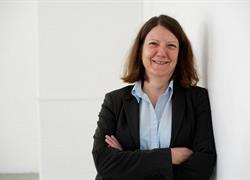University of Northampton’s Professor Margaret Bates voted as Junior Vice President of the Chartered Institution of Wastes Management
Date 16.11.2015

Margaret Bates, Professor of Sustainable Wastes Management in the School of Science and Technology, has been elected as the next Junior Vice President of the Chartered Institution of Wastes Management (CIWM).
Professor Bates will take up her position in October this year, and will become President of the CIWM in 2016. The professional body represents waste and resource professionals worldwide.
Having been involved in wastes management for over 20 years, Professor Bates’ expertise lies in landfill, energy from waste, resource efficiency and more recently waste electrical and electronic equipment (WEEE). She has advised governments on wastes management policy, and delivered training through the United Nations University. Professor Bates also manages the University of Northampton’ Centre for Sustainable Wastes Management, and sits on numerous editorial boards. In January, she was voted number 30 in Resource Magazine’s Hot 100 most influential people in the industry.
In her campaign speech, Professor Bates explained how the CIWM has supported her throughout her career: “The key constant since I finished my PhD is CIWM – in fact if it wasn’t for CIWM and its involvement with the University I probably wouldn’t be in my current position.”
“I hope to be able to raise the awareness of the positive sides of our industry showing that waste management is the solution not the problem. My connections with brands and other organisations such as the United Nations are an excellent opportunity to raise the profile of CIWM and, in particular, internationally show the value of a professional body.”
Professor Bates’ extensive research has been featured on BBC Panorama, in the Guardian and Radio 4, as well as local radio, television and press. Recently she has been working in collaboration with the University of Ibadan in Nigeria to address the country’s training and educational needs. Her work in Nigeria aims to end the persistent dumping of toxic wastes in the country.
For further information about the CIWM, visit their website.